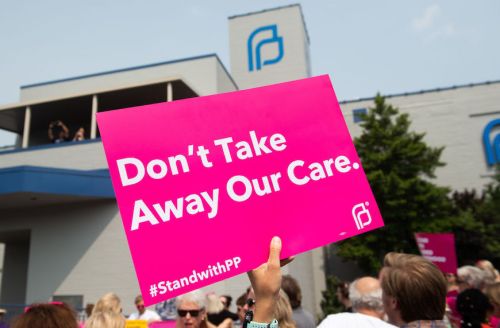Late last week, South Carolina’s Governor, Henry Mc Master, signed a law effectively making abortions performed after six weeks of pregnancy illegal in the state. The next day, Planned Parenthood sued and as a result, the federal courts temporarily blocked the abortion ban from going into effect. (So to be clear, abortion is still legal in South Carolina.)
Experts in This Article
Rachel Fey is the senior director of public policy at Power to Decide, where she leads the organization’s federal health policy and advocacy portfolio.
The law requires that health-care practitioners check for fetal cardiac activity before performing an abortion—something that is detectable at about six weeks of pregnancy. If such activity is detected, the law says it would be illegal to perform an abortion with very few exceptions. While the person receiving the abortion would not be legally punished for violating this law, the abortion provider would be charged with a felony and either fined $10,000, sentenced to prison for up to two years, or both.
There are several obvious problems to South Carolina’s abortion ban that serve mostly to make abortion access incredibly difficult. For one thing, those who are sexually assaulted are not exempt from this law unless their abortion provider reports their assault to law enforcement—which Rachel Fey, senior director of public policy at Power to Decide, points out is a breach of doctor-patient confidentiality. Fey also notes that many people don’t even know they’re pregnant as early as six weeks after conception (which would be shortly after your first missed period), which means this law essentially attempts to strip South Carolina residents of their choice and access, full-stop.
That the courts blocked the law from going into effect is not surprising, Fey says, given that it directly challenges the precedent set by Roe v. Wade—the 1973 Supreme Court ruling that confirmed abortion was a right protected by the Constitution. In other words, South Carolina’s six-week ban is unconstitutional.
“I see no light at the end of the tunnel for states continuing to push these laws.” —Rachel Fey, Power to Decide
The state is not the first, however, to attempt to pass such a law. Currently, Mississippi has one banning abortion after 15 weeks post-conception, which has also been temporarily blocked by the courts. That case has now worked its way up to the Supreme Court, which has not yet agreed to hear it. Georgia, Louisiana, Kentucky, Missouri, and Ohio also have similar laws on the books and, according to the Center for Reproductive Rights, states have introduced or filed over 200 bills aiming to restrict or ban abortion in just the last two months. (It doesn’t help that the pandemic has been used as a pretext by lawmakers to restrict access, including banning the use of telemedicine for medication abortion.)
Fey warns that we can likely expect to see similar efforts to ban or overly restrict abortion access attempted in other states now that the conservative majority on the Supreme Court is even larger—meaning there’s theoretically a greater chance of getting the Supreme Court to narrow the scope of Roe v. Wade or overturn it altogether. “I see no light at the end of the tunnel for states continuing to push these laws,” she says. Supreme Court justices are, after all, appointed for life.
Any and all of these attempts to restrict abortion access, adds Fey, disproportionately affect lower-income individuals. And as a result of systemic racism in this country, this means that BIPOC populations are subsequently affected more significantly than white populations. Plus, because these laws are now in the court system rather than in the legislation phase, there’s not much we as individuals can do to influence their fate.
This doesn’t mean, however, that there is nothing to be done if you—like many Americans—support abortion rights. If you live in a state partial to abortion restrictions, advocating and voting for legislators who are not is crucial. Fey also says you should also pay attention to what’s happening with the Hyde Amendment, a federal law from the ’70s that prevents federal tax dollars (including federal Medicaid money) from being used to fund the majority of abortion care. “There’s a very big push to ensure the Hyde Amendment is eliminated from federal funding legislation, which means it would need to be eliminated from President Biden’s budget, ideally, and that Congress should not pass appropriations bills that include the Hyde Amendment.” To advocate for this, Fey recommends contacting your representatives in Congress.
Though laws like the one South Carolina attempted to sign into law last week are alarming, Fey emphasizes that abortion remains legal in South Carolina, and in all fifty states. If you need help accessing care, she recommends utilizing Power to Decide’s Abortion Finder.
Oh hi! You look like someone who loves free workouts, discounts for cult-fave wellness brands, and exclusive Well+Good content. Sign up for Well+, our online community of wellness insiders, and unlock your rewards instantly.
Sign Up for Our Daily Newsletter
Get all the latest in wellness, trends, food, fitness, beauty, and more delivered right to your inbox.
Got it, you've been added to our email list.











